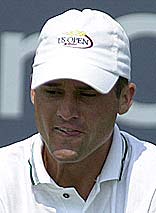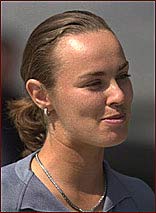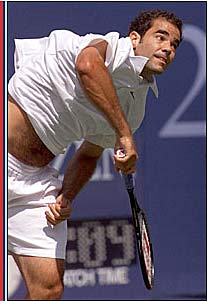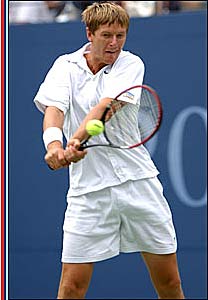<% ns_puts [mkm_getnavbar] %>
Psycho-superlatives and Psycho-Flops:
The 2001 U.S. Open
Here are some of my final impressions of this year's U.S. Open from a psychological perspective. They pertain to specific matches, players, and the event itself.
1. The new 32 player seeding system: You can look at this as a flop or stroke of superb planning depending what your vested interests are. As a player in the top 32 you probably are very happy. No longer do you have to face "top" players in the early rounds. That takes the pressure off.
Television probably likes the new system as well. The odds increase significantly that marquee match-ups will occur later on in the tournament when ratings are more critical. Obviously, it's easier to sell "known" names to the masses of casual viewers who turn-on more to see an event and stars on the court than the actual match. That was very noticeable during the Williams sister exhibition (oops, I meant final). However, for the hard-core tennis aficionado the new ranking system took a lot of the drama out of the tournament. There were few early round upsets and with a few exceptions the night matches were quite dull. I prefer the old 16 seed format. A Psycho-Flop!
 |
 |
 |
Brasington (left), Hinigis, and Mirnyi get Psycho-Superlatives at the Open |
||
2. Hewitt incident: Too bad the foot fault incident had to happen in this tournament. Not too many people believed his statement "look at the similarities" had anything to do with the fact that the linesman who called him for foot-faulting was the same person. Most felt Lleyton was insinuating that the foot fault calls were racially motivated. Ah, yes, reverse discrimination at work, a conspiracy. Obviously, in the heat of the battle we probably all have said things we regret. Unfortunately Hewitt's faux pas stuck like a monkey on his back with Mary Carillo bringing it up at least 3 times during Hewitt's final 2 matches. This was a major Psycho-Flop, one that could come back to haunt him especially in the context of his viability as a commercial and product spokesman in the USA.
3. Mirnyi/Kuerten Match: What a match. Mirnyi had a sort of coming out party showing the tennis world what he can do with Kuerten refusing to die. Guestavo's efforts in this match may have contributed to his demise against Kafelinkov . A Psycho-Superlative.
4. Venus versus Serena: Despite all the hype the match fizzled early. Many persons including Mary Carillo speculated that not all was kosher, that the Williams sisters' matches are staged in accord with who needs another title more. Obviously the match was not staged. Nevertheless, the reputation of the sister matches was not enhanced, with one sister or the other unable to play their best when it's all in the family. A major Psycho-Flop.
5. Brasington's play: What a run this lowly ranked player had. He almost extended Andy Roddick to a 5th set and probably would have had a chance to beat him. Let's see if he can capitalize on his US Open experience to propel himself to the next level more than Michael Russell did after his incredible French Open "near-win" against Kuerten. A Psycho-superlative.
6. The small and little players: As a small guy myself I have to tip my hat to those smaller players led by Lleyton Hewitt who battled their way into the limelight at this year's Open. Although all with the exception of Hewitt obviously lost you have to admire the Rochus brothers from Belgium who are actually smaller than their more famous Belgian female compatriots Henin and Clisters. Then there's Hingis, who although getting blown away by Serena still show's an incredible fighting spirit and motivation despite knowing (at least subconsciously) she'll probably never beat the big girls again in a major final. Psycho-Superlatives all the way around here.
 |
 |
Sampras and Kafelinkov had great Opens but both failed to show up against Lleyton Hewitt |
|
7. Sampras/Agassi Match: A battle of the ages. How we wished this would have been the final. We saw Sampras again at his best against the best. You may ask, "how could he beat Agassi and lose to Hewitt?" After all, Agassi has a bigger game, is the better returner, and has more experience that Lleyton.
I've already given my psychodynamic perspective on both matches so you might want to reread them. On a more simplistic level, we all know every match is different and no opponent plays the same all the time. Until players apply methods to deal with psychophysiological fluctuations we can always expect this to be the case. At any rate, this match earned a Psycho-Superlative.
8. Hewitt/Roddick Match: Another great match. Some of you are probably still p_ _ _ _ d at the overrule that may have cost Roddick the match. Bringing up this match gives me the opportunity to briefly comment on Roddick. Although he has the game and raw talent to find a permanent place in the top-10 I am not convinced that he will go on to be number one or win a slam. I've noticed a chip in his psychological armor that has to be dealt with. This is top-secret for now. This match gets a Psycho-Superlative.
9. Davenport/Williams Match: Too often TV commentators and viewers forget that just because you hit a big shot at the right time does not make you mentally tough, especially if you blew game after game and got yourself in a situation you never should have been in. This applies to both Davenport and Williams. A Psycho-flop.
10. Kafelinkov dive - Sampras' play against Hewitt: I'd like to amend or downgrade these matches to a minor as opposed to major Flop giving both players the benefit of the doubt and attributing their losses to Hewitt's stellar play, but I won't since I still maintain both Pete and Kafelnikov were not properly prepared to play their best.
See you at the Australian Open
Your comments are welcome. Let us know what you about think this article by emailing us here at TennisONE.
Dr. Roland A. Carlstedt has followed the professional
tennis tours since 1985, fulltime from 1989-1998 in which he on average
attended 25 tournaments a year including all Grand Slam events and
important Davis Cup ties. During this time he complied perhaps the most
extensive database in existence on the psychological performance,
tendencies, and profiles of most ATP and WTA players. His annual
Psychological World Rankings for Tennis have been published since 1991
more than 500 times in over 40 countries. His rankings and data are based
on his Psychological Observation System for Tennis. Interestingly his 2000
rankings which were released prior to the 2001 Australian Open had 2 of 4
semifinalists and 8 of 16 quarterfinalists on them including such unlikely
players as Arnaud Clement and Sebastian Grossjean. His 2001 rankings will
appear in TennisONE at the end of the year.
Last Updated 9/7/01. To contact us, please email to: webmaster@tennisone.com
TennisONE is a registered trademark of TennisONE and SportsWeb ONE; Copyright 1995. All rights reserved.
